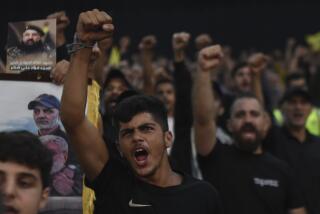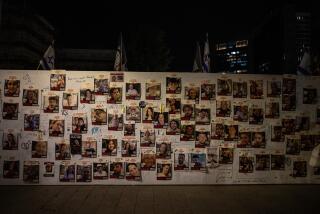Op-Ed: Pundits think Islamic State’s Baghdadi is smart because he’s cruel. That’s nonsense
Is Abu Bakr Baghdadi, the infamously cruel Islamic State leader, an unusually smart terrorist?
Terrorism pundits seem to think the answer is âyesâ â precisely because heâs turned cruelty into a sort of brand. He gained notoriety in the West for indiscriminately killing civilians and then directing his followers to brag about wanton bloodshed in âJihadi Johnâ beheading videos. Many would argue that, by leaving a photographic trail of bloodshed in his wake, Baghdadi has surpassed Osama bin Laden, the former Al Qaeda leader. In a Politico article from last year, for example, a prominent Brookings analyst exclaimed that Baghdadi âout-terrorized bin Laden,â who never fully grasped how well âviolence and gore work.â
I see things differently. I think the Islamic State CEO is an unusually stupid terrorist â precisely because heâs turned cruelty into a sort of brand.
For a decade, political scientists have known that terrorist groups suffer when they exercise too little restraint by attacking civilians. Civilian attacks carry substantial downside risks by strengthening the resolve of target countries, eroding their confidence in negotiations, lowering the odds of government concessions, reducing popular support for the group and, all in all, expediting its demise.
Islamic State’s radical branding has ... encouraged target countries to attack them, spurred desertions from their ranks and eaten away at local support.
Of course thereâs no denying that a tiny slice of the worldâs population is lured to Islamic State because of its barbarism. For those itching to decapitate foreigners or cage Kurdish children or rape Yazidi girls, the groupâs marketing approach is awfully enticing. Simultaneously, however, Islamic Stateâs radical branding has led to attrition; it has encouraged target countries to attack them, spurred desertions from their ranks and eaten away at local support.
It therefore doesnât surprise me at all that Islamic State is losing battles, territory, revenue and the cash to pay its dwindling fighters in its strongholds of Iraq and Syria. Meanwhile, competing Islamist groups, such as Ahrar al-Sham and Jabhat al Nusra, are trading on their more moderate branding strategies to expand their territorial control, membership rosters and material support, especially from Sunni Gulf countries and Turkey.
Other terrorist leaders generally have a better appreciation than does Baghdadi about the costs of extremism; they therefore present themselves as somewhat restrained. When Al Nusra fighters slaughtered 20 Druze villagers last year in northwestern Syria, for example, the leadership publicly announced these wayward killers would stand trial before an Islamic court. When Ahrar al-Sham was accused of mistreating Syrian minorities, its leadership penned an op-ed in the Washington Post, insisting that the group is actually âfighting for justice for the Syrian people.â
Indeed, the historical record abounds with militant leaders warning their foot soldiers to refrain from attacking civilians because of the political fallout. Mao Tse-tung repeatedly impressed on his fighters the importance of cultivating what he called a âunity of spirit that should exist between troops and local inhabitants.â In the 1980s, Sinn Fein assailed operatives in the Provisional Irish Republican Army for harming civilians because of the political backlash. The al-Aqsa Martyrsâ Brigades chief, Marwan Barghouti, has advocated Palestinian attacks against the Israel Defense Forces, while opposing attacks against Israeli civilians within the pre-1967 borders or so-called Green Line. According to Barghouti, Israeli civilians should be off-limits because historically such indiscriminate violence has been âdetrimental to us.â
The FARC leadership in Colombia has likewise ârepudiated and condemnedâ its fighters for their âlack of foresightâ in attacking civilians. Even the Al Qaeda leadership has reprimanded its foot soldiers for attacking civilians in Afghanistan, Algeria, Egypt, Iraq, Lebanon, Somalia, Syria and Yemen. In fact, Al Qaeda leaders are increasingly issuing public apologies when operatives defy their orders by harming civilians, especially Muslim ones. Such apologies are found across militant groups from Colombiaâs National Liberation Army to Lebanonâs Abdullah Azzam Brigades to Nepalâs Communist Party.
Research substantiates the anecdotal evidence that smart terrorists recognize the strategic importance of restraint.
In a recent paper, Phil Potter and I show statistically in a sample of hundreds of terrorist groups that they have tended to attack civilians only when the leaders were too weak to impose their tactical preferences on lower-level members. For this reason, terrorist groups are significantly more likely to attack civilians after the leaders have been killed in drone strikes or when their fighters gain some autonomy by traveling farther away from them to mount operations.
In a forthcoming paper in Security Studies, Justin Conrad and I find additional evidence that terrorist leaders generally understand the political risks of attacking civilians and therefore try to brand their group as more moderate. Specifically, we reveal that over the past four decades, the hundreds of terrorist groups around the world have claimed credit for only about 1 out of 7 of their attacks. And when their operatives have struck civilian targets, the likelihood of their leaders taking organizational credit drops by an additional 29%.
Conversely, Northeastern University colleagues and I show in a forthcoming paper in Studies in Conflict and Terrorism that terrorist propaganda videos usually avoid showcasing attacks against civilians, especially when the leaders exercise greater control over the content.
Islamic State operates differently. Rather than trying to curtail attacks against civilians, the leadership encourages them. Baghdadi is an outlier not only because he gives the green light for operatives to strike almost any target in the world, but also because he claims credit for the unpopular attacks and even brags about them on social media.
Those who believe that Baghdadi is a mastermind have been appealing to companies like Twitter and Facebook to remove his violent online content. They think we have to blunt the impact of his media-savvy groupâs cruelty-mongering if weâre going to stand a chance against him. But Baghdadi is no mastermind; and Twitter and Facebook shouldnât be condemned for helping Islamic State. These companies instead should be commended for exposing the groupâs heinous behavior, and thereby turning the world against it.
Max Abrahms is a professor of political science and public policy at Northeastern University.
Follow the Opinion section on Twitter @latimesopinion and Facebook
More to Read
A cure for the common opinion
Get thought-provoking perspectives with our weekly newsletter.
You may occasionally receive promotional content from the Los Angeles Times.










